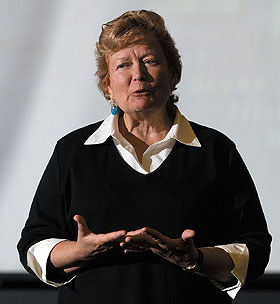  |
| HOME | THIS ISSUE | CALENDAR | GRANTS | BACK ISSUES | < BACK | NEXT > |
Hospice helps people 'die well,' speaker says by Gregory Hladky - March 31, 2008 | ||||
| Since it began more than 40 years ago, the hospice movement has revolutionized pain management for the terminally ill, changed the way doctors are taught, and sparked major reforms in the medical industry. But D. Brookes Cowan believes the greatest barrier to the movement’s goal of helping people “to die well” is an American culture “that continues to see death and dying as failure.” “We have a long way to go,” Cowan said during a lecture March 26 that was sponsored by the Department of Human Development and Family Studies and the Foote Lecture Fund. Cowan is a medical sociologist, gerontologist, end-of-life care specialist, and a senior lecturer in at the University of Vermont. She was also involved in making the critically acclaimed documentary, Pioneers of Hospice: Changing the Face of Dying, released in 2004. The film, which was shown during Cowan’s lecture, details the contributions and philosophies of four of the founders of the hospice movement, including Elisabeth Kübler-Ross, author of On Death and Dying. By the 1950s and 1960s, according to Cowan, modern medicine had become almost totally preoccupied with curing illnesses and didn’t want to deal with those it couldn’t. “The medical system considered dying a failure,” she said. Cowan cited studies that found poor dying patients were often prepared for the morgue while they were still living, with tags tied to their toes as they were placed on gurneys in hospital hallways to wait alone for death. But the civil rights movement of the 1960s also helped trigger a patients’ rights movement that included the creation of the first hospices in London and Branford, Conn., Cowan said. Today, there are more than 4,500 hospices operating in the United States and some 8,000 hospice programs in 100 countries around the world. An estimated 1.3 million Americans received hospice care in 2006, according to Cowan. “So much has changed for the better as a result of hospice,” she said. Those successes have included congressional approval of reforms in Medicare and Medicaid funding for hospice care, and dramatic shifts in attitude within the medical profession toward pain management.
Cowan said doctors often in the past refused to prescribe narcotics for terminal patients because of fears about addiction or a lack of understanding about how much their patients were suffering. Today, experts estimate that 95 percent of all terminal patients can die without pain if their care is properly managed, she said. Hospitals are now creating “palliative care units” to treat people suffering from illnesses that may lead to death, and Cowan said those units can serve as a bridge between regular hospitals and hospices. Cowan said there remain significant barriers to the goal of provide good hospice care to all those who need it in this country. For-profit operations are beginning to dominate what has become a hospice care industry and they may be driving out the small, community-oriented hospice programs that Cowan advocates. Many physicians still don’t know how to deal with patients they cannot cure, and remain reluctant to medically certify that a person is expected to die within six months – a prognosis required for federal reimbursement for hospice care. But Cowan is convinced that America’s attitude toward the dying can be altered, and that the hospice movement will continue to advance. “Hospice is a bright light,” she said, “and we just need to spread that light to the dark corners.” |
| ADVANCE HOME UCONN HOME |

